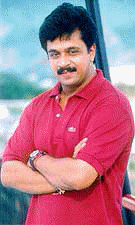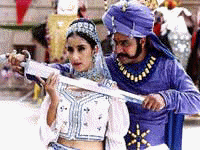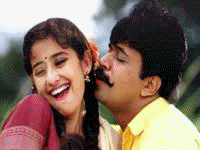|
|
|
He is the man with the macho
appeal. Trained in karate from his childhood, he had a fit
physique, and his ambition was to become a police officer. But
fate had other ideas and Arjun became a star. This would not have
happened if his father had had his way. Few know that Arjun,
whose real name is Ashok Sarja, is a star son. His father the
late Shakti Prasad was a renowned and popular actor of Kannada
films. He was a stage actor from a remote village, and in his
career spanning thirty years, he had done about two hundred and
fifty films. He had come up the hard way and did not want his son
to  take
up his profession. For he knew the insecurities, and the toil and
tears that went with it. "No films for you," he would
always tell his son. Arjun himself had never thought of a career
in films. While in his teens he was offered a role, but his
father said a firm '‘No! The role went to another boy, and
the film went on to become a big hit. Arjun happened to see the
film at a theatre, and the applause the boy received kindled in
him an interest for the acting profession.
take
up his profession. For he knew the insecurities, and the toil and
tears that went with it. "No films for you," he would
always tell his son. Arjun himself had never thought of a career
in films. While in his teens he was offered a role, but his
father said a firm '‘No! The role went to another boy, and
the film went on to become a big hit. Arjun happened to see the
film at a theatre, and the applause the boy received kindled in
him an interest for the acting profession.
Arjun talks about how he subsequently joined films.
Eminent Kannada film director Rajender Singh Babu was the next one to offer me a film. The offer came to me in a very funny way. A car was sent to my house and I was informed that I was to go to a studio where my father was supposed to be waiting for me. I went with my brother, but my father was nowhere there. The director was there. He first asked me to remove my shirt. I did, and he probably saw what he liked, for he said that I would be playing the lead in his new film. I hesitated, but then he said that he had got my father’s consent. I said, that if it’s ok with my father, it was ok with me too. When I returned home, my father was there, wondering where I had gone. When I told him all that had happened he was surprised and said that he had known nothing about it. Anyway he reluctantly agreed. All that he said was, "Now that you’re in this field, try to make a success of it". It was the director again who gave me the name of Arjun, after the character I played in the film.
Arjun was candid and outspoken as he answered the questions put to him. What was striking was his extreme confidence. And it is this, coupled with a quiet determination that has seen him through all the ups and downs of his film career. If his father was alive, he would have been proud of all that his son had achieved, and the enviable slot he has carved for himself. Particularly the way he had steered himself through the stormy phases of his career.
Ques: From Kannada to Tamil and then to Telugu films. How did the transition come about?
While I was acting in Kannada films, I got this offer from actor-producer A.V.M. Rajan and director Ramanarayanan to do a Tamil film. The film was ‘Nanri’. Simultaneously I was offered a film in Telugu too. The Telugu film went on to be a big success, running for a year in three centres. After that I was doing more of Telugu films, sometimes even seven shifts a day.
Ques: Does the label of ‘action King’ slot you and limit your choices?
 No, not
really. This image of an action hero works more on the B and C
centre audiences who love my fights and stunts. I too make a
conscious effort to come out of the image and try to choose
different kinds of roles where I can prove my versatility.
No, not
really. This image of an action hero works more on the B and C
centre audiences who love my fights and stunts. I too make a
conscious effort to come out of the image and try to choose
different kinds of roles where I can prove my versatility.
Quest: On what basis do you choose your roles. Is it the story, banner or director that decides your choice?
It’s mainly the subject value. When I hear a story, I should feel that it is a role in which I can get my teeth into. A subject that it different from the routine ones, or a role that is interesting and challenging, where I can display my talent, excites me.
Quest: Which role to date has satisfied the artiste in you?
I liked my role in Shankar’s ‘Gentleman’ and in ‘Muthalvan’ too. Also my role in ‘Jai Hind’ written and directed by me. In ‘Ayudha Pooja’ too I had an interesting role.
Quest: How much do you identify with the role of Pugazhendi in ‘Muthalvan’. Would you like to join politics if given the chance?
Pugazhendi was a character Shankar had conceived and I had enjoyed doing. And that’s it. I am not at all interested in joining politics. I feel that if one really wants to do something for the people, one need not necessarily join politics to do it.
Quest: You have worked with Shankar in his first directorial venture. Now you are working with a successful director in his first home production too. What changes do you see in him?
Yes, Shankar has changed. But this change in him is as a technician. He was a good technician then too. But today he has evolved tremendously. I can see in him the same spark, the same enthusiasm. The energy he puts in his work is unbelievable. And it is this sincerity that commands respect. Earlier I used to address him like, "Hello Shankar, how are you?" kind of thing. Now I don’t feel like being so casual with him. A quality I like, in him, is that, even today he gives the same respect and consideration to every artiste and technician who works with him. He does not discriminate between the big names and the small.
Quest: One of the main reasons cited for the rising cost of film production is the astronomical rates charged by the stars. Comment.
It’s a general question that I alone cannot answer. But since you’re asking me I’ll reply. We artistes have a limited career span. If the film of a particular star flops, no one is ready to even talk to him or look at him, leave alone offer him a role. I can speak from my own personal experience. In 1980, I had five flops in a row and lost my market. At that time no producer came forward to book me, though I was willing to work for a sum of just fifty thousand rupees. For one and a half years, I was sitting at home with no work. It’s like a horse race. No one wants to bet on a limping horse. It’s only when an artiste has a demand in the market that he gets his price. A producer is intelligent enough to know which star has the market value that would help him sell his film. And it’s not that all the stars are selfish. I know personally of many heroes who have slashed their rates to help out a producer who is going through a financial crisis, particularly if that hero’s film with the producer has flopped.
Quest: If any good role comes your way would you slash your rate?
Yes, of course. I would do it. If the character is challenging, I would definitely consider it. Provided the guarantee is there that the film would be completed and released, and get decent publicity and promotion.
 Quest:
Any dream role you would like to do. Any character from some film
has inspired you?
Quest:
Any dream role you would like to do. Any character from some film
has inspired you?
Yes. I saw this film ‘Scar Face’. I was very inspired by the character and the performance of Al Pacino.
Quest: With your clout you can definitely have such roles created for you.
Yes. But certain roles are difficult to Indianise. Further, here we have to take so many commercial ingredients into consideration.
Quest: Where do you see yourself ten years from now?
Not as a hero, but as a producer and director. I am 36 now. So ten years later I don’t think I would like to be in front of the camera.
Quest: What are your forthcoming films?
My next release is ‘RHYTHM’ directed by Vasanth, with music by Rehman. Produced by Pyramid Films, it has Meena as my co-star. It is a love story and I have a soft character in it. Then there is this movie with Jyotika for K.B. Films. Selva directs it. I have just signed ‘Swatantram’, produced by K.R.G. To be directed by Rajkapoor, it has Rambha as my co-star.
Yet another film on the floors is the one to be directed by Jagan, who had assisted me earlier, that is being produced by C.V. Rajendran. And then there is the film to be directed and produced by Manoj Kumar.
Arjun’s favourites:
Hero
: Sivaji Ganesan, Kamal Haasan, Kartik
Heroine
: Kajol
Food
: Chicken Dishes
Colour
: Lemon Yellow
Flower
: The ‘Champa’
Holiday
: Countryside in Switzerland
Eating joint : Home
His strength :
Self-confidence
His weakness : Outspokenness
Malini Mannath